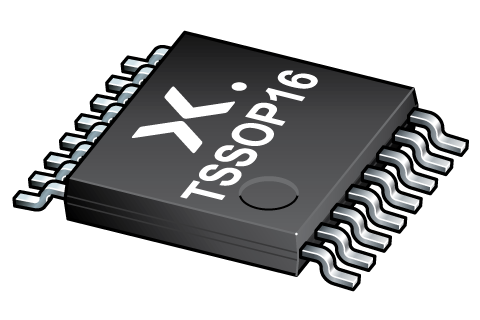可订购部件
| 型号 | 可订购的器件编号 | 订购代码(12NC) | 封装 | 从经销商处购买 |
|---|---|---|---|---|
| 74HC4851PW | 74HC4851PW,118 | 935282084118 | SOT403-1 | 订单产品 |

Register once, drag and drop ECAD models into your CAD tool and speed up your design.
Click here for more information8-channel analog multiplexer/demultiplexer with injection-current effect control
The 74HC4851; 74HCT4851 are high-speed Si-gate CMOS devices and are specified in compliance with JEDEC standard no. 7A.
The 74HC4851; 74HCT4851 are 8-channel analog multiplexers/demultiplexers with three digital select inputs (S0 to S2), an active-LOW enable input (E), eight independent inputs/outputs (Y0 to Y7) and a common input/output (Z). The devices feature injection-current effect control, which has excellent value in automotive applications where voltages in excess of the supply voltage are common.
With E LOW, one of the eight switches is selected (low impedance ON-state) by S0 to S2. With E HIGH, all switches are in the high-impedance OFF-state, independent of S0 to S2.
The injection-current effect control allows signals at disabled analog input channels to exceed the supply voltage without affecting the signal of the enabled analog channel. This eliminates the need for external diode/resistor networks typically used to keep the analog channel signals within the supply-voltage range.
Injection-current cross coupling < 1 mV/mA
Wide supply voltage range from 2.0 V to 6.0 V for 74HC4851
Latch-up performance exceeds 100 mA per JESD 78 Class II level A
Low ON-state resistance:
400 Ω (typical) at VCC = 2.0 V
215 Ω (typical) at VCC = 3.0 V
120 Ω (typical) at VCC = 3.3 V
76 Ω (typical) at VCC = 4.5 V
59 Ω (typical) at VCC = 6.0 V
ESD protection:
HBM: ANSI/ESDA/JEDEC JS-001 class 2 exceeds 2000 V
CDM: ANSI/ESDA/JEDEC JS-002 class C3 exceeds 1000 V
Multiple package options
Specified from -40 °C to +85 °C and -40 °C to +125 °C
Analog multiplexing and demultiplexing
Digital multiplexing and demultiplexing
Signal gating
| 型号 | Configuration | VCC (V) | Logic switching levels | RON (Ω) | RON(FLAT) (Ω) | f(-3dB) (MHz) | THD (%) | Xtalk (dB) | Power dissipation considerations | Tamb (°C) | Rth(j-a) (K/W) | Ψth(j-top) (K/W) | Rth(j-c) (K/W) | Package name |
|---|---|---|---|---|---|---|---|---|---|---|---|---|---|---|
| 74HC4851PW | SP8T-Z | 2.0 - 10.0 | CMOS | 220 | - | - | - | - | very low | -40~125 | 112 | 1.7 | 40.5 | TSSOP16 |
| Model Name | 描述 |
|---|---|
|
|
| 型号 | 可订购的器件编号,(订购码(12NC)) | 状态 | 标示 | 封装 | 外形图 | 回流焊/波峰焊 | 包装 |
|---|---|---|---|---|---|---|---|
| 74HC4851PW | 74HC4851PW,118 (935282084118) |
Active | HC4851 |

TSSOP16 (SOT403-1) |
SOT403-1 |
SSOP-TSSOP-VSO-WAVE
|
SOT403-1_118 |
| 文件名称 | 标题 | 类型 | 日期 |
|---|---|---|---|
| 74HC_HCT4851 | 8-channel analog multiplexer/demultiplexer with injection-current effect control | Data sheet | 2024-05-30 |
| AN11044 | Pin FMEA 74HC/74HCT family | Application note | 2019-01-09 |
| SOT403-1 | 3D model for products with SOT403-1 package | Design support | 2020-01-22 |
| hc4851 | 74HC4851 IBIS model | IBIS model | 2018-09-12 |
| Nexperia_package_poster | Nexperia package poster | Leaflet | 2020-05-15 |
| TSSOP16_SOT403-1_mk | plastic, thin shrink small outline package; 16 leads; 0.65 mm pitch; 5 mm x 4.4 mm x 1.1 mm body | Marcom graphics | 2017-01-28 |
| SOT403-1 | plastic, thin shrink small outline package; 16 leads; 5 mm x 4.4 mm x 1.2 mm body | Package information | 2023-11-08 |
| SOT403-1_118 | TSSOP16; Reel pack for SMD, 13"; Q1/T1 product orientation | Packing information | 2020-04-21 |
| 74HC4851PW_Nexperia_Product_Reliability | 74HC4851PW Nexperia Product Reliability | Quality document | 2025-03-20 |
| HCT_USER_GUIDE | HC/T User Guide | User manual | 1997-10-31 |
| SSOP-TSSOP-VSO-WAVE | Footprint for wave soldering | Wave soldering | 2009-10-08 |
The Nexperia Longevity Program is aimed to provide our customers information from time to time about the expected time that our products can be ordered. The NLP is reviewed and updated regularly by our Executive Management Team. View our longevity program here.
| Model Name | 描述 |
|---|---|
|
|
| 型号 | Orderable part number | Ordering code (12NC) | 状态 | 包装 | Packing Quantity | 在线购买 |
|---|---|---|---|---|---|---|
| 74HC4851PW | 74HC4851PW,118 | 935282084118 | Active | SOT403-1_118 | 2,500 | 订单产品 |
作为 Nexperia 的客户,您可以通过我们的销售机构订购样品。
如果您没有 Nexperia 的直接账户,我们的全球和地区分销商网络可为您提供 Nexperia 样品支持。查看官方经销商列表。
The interactive datasheets are based on the Nexperia MOSFET precision electrothermal models. With our interactive datasheets you can simply specify your own conditions interactively. Start by changing the values of the conditions. You can do this by using the sliders in the condition fields. By dragging the sliders you will see how the MOSFET will perform at the new conditions set.